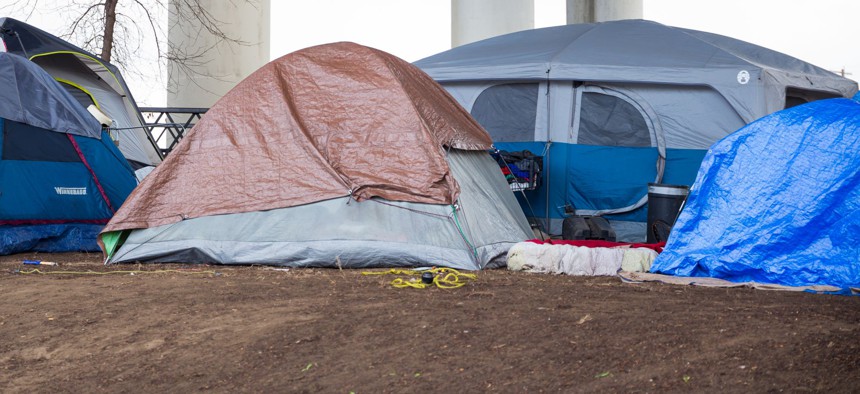By the Numbers: How Homeless Camps Strain One City’s Parks Resources

Shutterstock
The need to remove hypodermic needles, clean up human waste and haul away trash add to budgetary difficulties in Oregon's second-largest city.
For Eugene, Oregon, like many cities in the Pacific Northwest, it’s been an increasingly difficult struggle to manage unauthorized homeless campsites within its borders.
Municipal outreach efforts concentrate on connecting homeless individuals with local social services and urging them not to camp illegally. Through community partnerships, Eugene, which is Oregon's second-largest municipality, has created six “rest stops” that “provide temporary, safe, legal places for people who are experiencing homelessness to sleep at night” for up to 20 campers at each site, according to the city. But those accommodations and other social services that provide shelter are limited in and around the city.
Lane County, which includes Eugene, found 1,451 homeless individuals in its annual point-in-time count for 2016. So it’s not surprising that it’s hard for authorities to keep up as more and more people are gravitating to Eugene’s parkland, particularly along the Willamette River.
As The Register Guard reported this weekend, in June, city parks personnel on patrol handed out 111 official notices to unauthorized campers which detail the park’s rules and mandate them to vacate their camps within 24 hours. The number of notices was just 37 the previous June.
While there are major costs involved with connecting homeless campers with social services, cleaning up illegal campsites isn’t cheap either. Eugene’s city government spends $250,000 annually on camp cleanup activities, including a $66,000 contract with the sheriff’s department—which provides jail labor three days a week to bolster the municipal response— according to The Register Guard. From January through the end of June, 4,500 bags of trash were removed from campsites, along with 2,200 hypodermic needles. (Human waste that can accumulate in homeless camps is harder to quantify.)
Belongings that are collected by Eugene work crews are held temporarily so campers can retrieve their items, the newspaper reported.
All in all, the more time Eugene parks personnel spend patrolling city land for unauthorized campsites and cleaning them up is time—and money—not being spent on other parks needs. It doesn’t help that the Eugene Parks and Open Space Division has seen budget reductions in recent years and has had to defer maintenance just as park acreage has grown.
Uprooting illegal campsites doesn’t solve the core problem since homeless individuals, with nowhere else to go, will simply move their camps elsewhere, sometimes to land under a different jurisdiction.
As KVAL-TV reported earlier this month, property controlled by the Oregon Department of Transportation adjacent to one Eugene neighborhood has drawn homeless camps—and complaints from nearby residents.
"Every few months it'll pop up; we'll have to complain and complain and complain and then they'll come clean it up and in a few months later they're back," Robert James, a 31-year resident of the neighborhood, told the television station.
That vicious cycle of unauthorized homeless camps will inevitably continue in Eugene, as it will in so many other communities. And the cleanup costs will surely continue to tick upward, too, without successful efforts that connect homeless campers with more stable housing situations that eliminate the need to illegally pitch tents in parks.
Michael Grass is Executive Editor of Government Executive’s Route Fifty and is based in Seattle.
NEXT STORY: As Acadia Nat’l Park Celebrates Centennial, Maine Gets New Nat’l Monument






